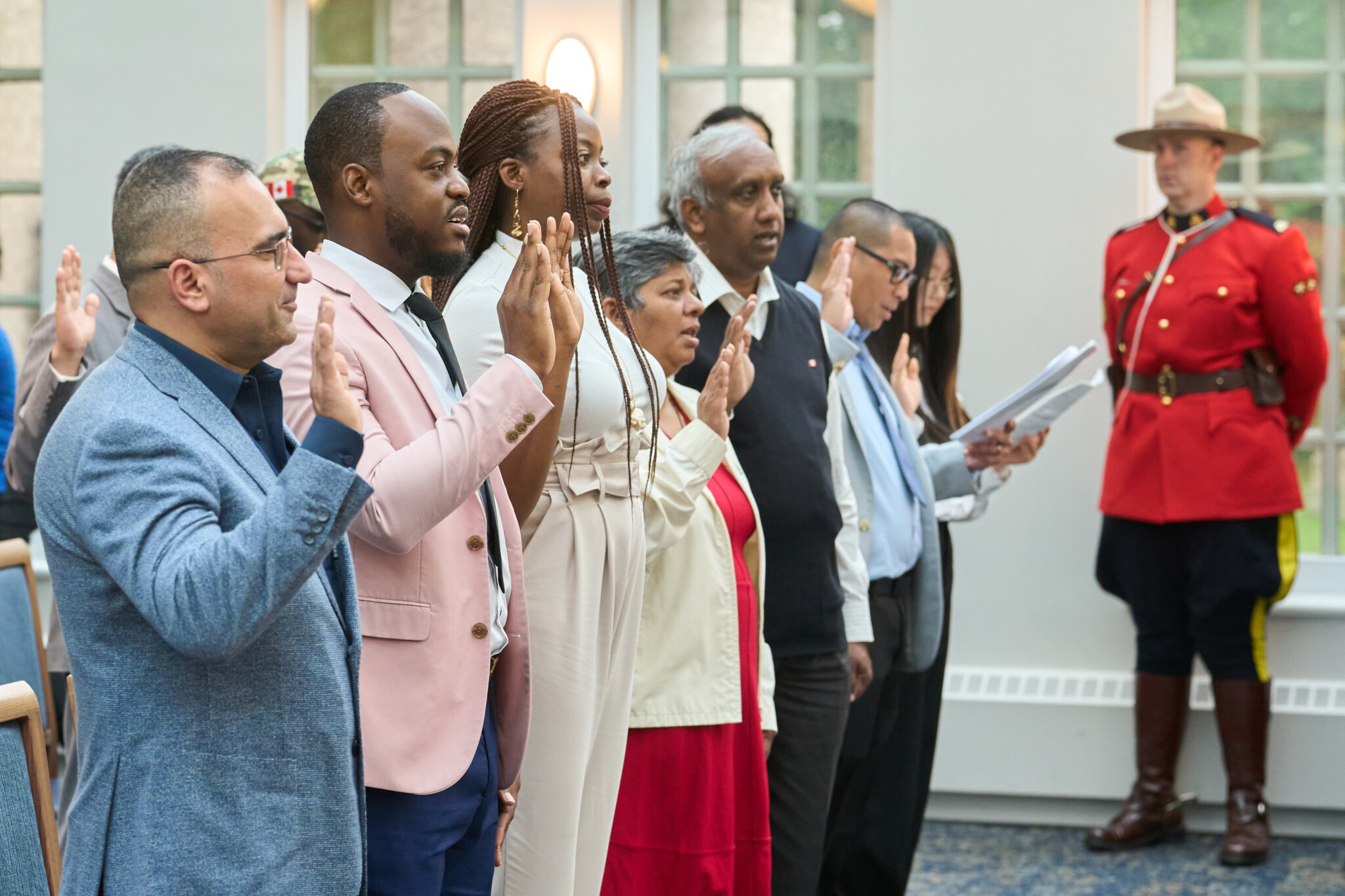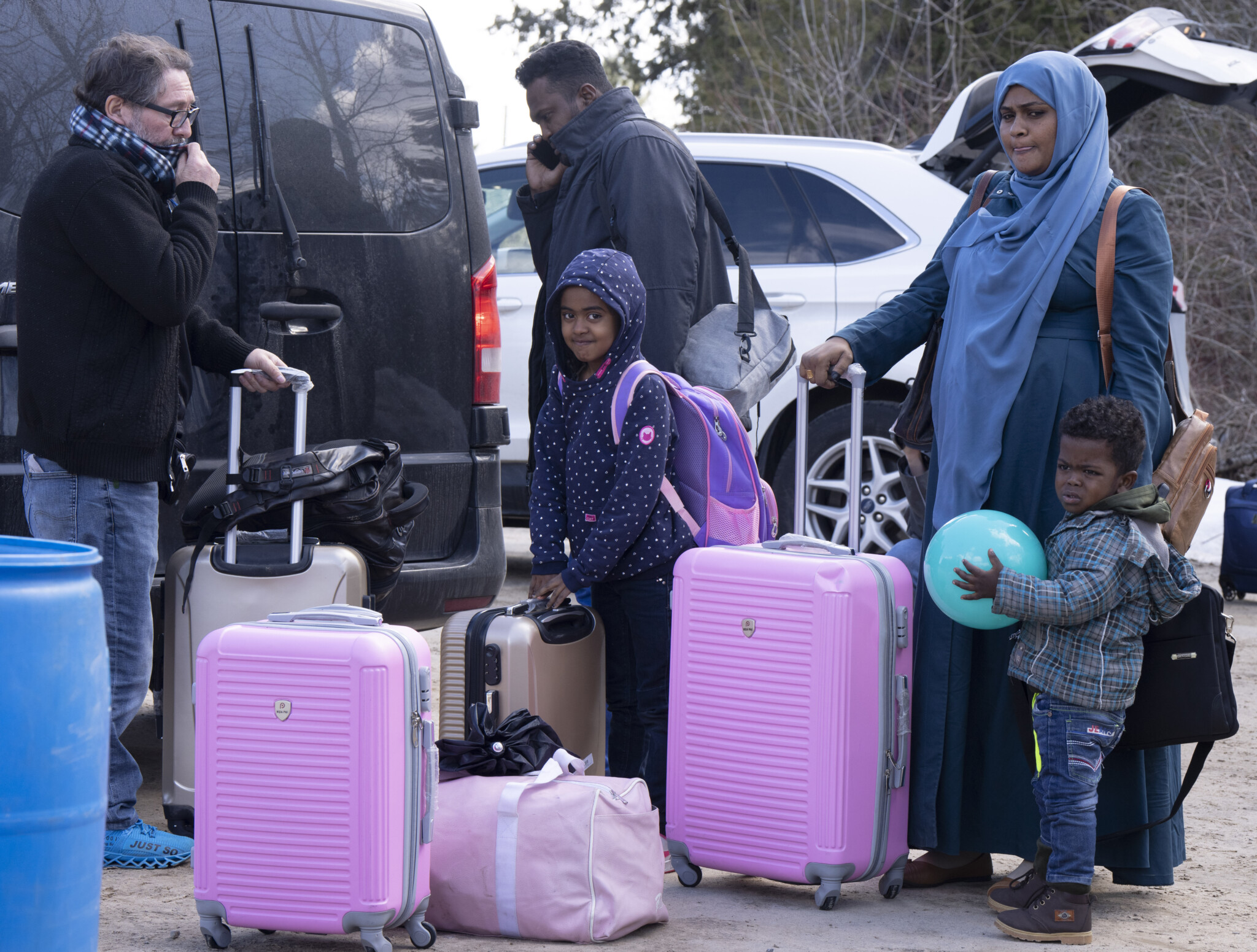Immigration experts say Canada could see a surge in illegal border crossings from the United States if Trump is re-elected this November amidst the Republican nominee’s promise to deport at least 11 million illegal migrants.
Experts The Hub spoke to said the Trudeau government should be prepared for this possible scenario, with one warning “[We]’ll get tens of thousands, maybe 100,000, or even millions” of migrants, many of whom illegally entered the U.S. during Biden’s first term, trying to enter Canada to escape deportation if the Canadian government embraces a pro-migrant message like the one it took during the last Trump administration.
Between 2016 and 2017, asylum claims in Canada more than doubled. Crossings at one prominent unofficial point of entry—Roxam Road— increased by 230 percent. According to internal government emails, a now infamous #WelcomeToCanada X post from Prime Minister Justin Trudeau in the wake of Trump’s executive order to ban refugees from Muslim-majority countries like Syria and Sudan helped contribute to a surge of refugees at Canada’s southern border.
To those fleeing persecution, terror & war, Canadians will welcome you, regardless of your faith. Diversity is our strength #WelcomeToCanada
— Justin Trudeau (@JustinTrudeau) January 28, 2017
Canada is already dealing with numerous strains on its immigration system, a system that has been labelled as “broken.”
With plans for an “extreme expansion” of his immigration agenda, Canada must start preparing now for how its immigration situation will be affected if Donald Trump becomes president again in November.
Trump’s promise of mass deportations
Data from the U.S. Office of Homeland Security shows there were 6.3 million migrant “encounters” at the American southern border between January 2021 and 2024, with more than 2.3 million migrants released into the country. Hundreds of thousands more encounters took place this year—though numbers are on the decline. There are also an estimated two million “got away” migrants who were not apprehended.
This influx comes at a significant cost to the United States, with estimates stating that illegal immigration is costing the American taxpayer over one hundred billion dollars per year. Many resources are also being stretched thin, with overcrowded migrant shelters and hotels and even situations where some migrants were housed in a school and community centres. Migrants were also made to take shelter at several major airports.
Meanwhile, thousands of criminals from abroad have attempted to enter the U.S., including hundreds who are affiliated with violent gangs like MS-13. Three hundred and seventy-eight foreign individuals on the U.S. terror watch list have been apprehended at the American southern border since 2021. While multiple studies have shown that illegal immigrants commit fewer crimes per capita than U.S. citizens, there have been several high-profile crimes committed by migrants in recent months, including the murder of Laken Riley, a 22-year-old nursing student from Georgia who was allegedly killed by Jose Ibarra, an illegal immigrant from Venezuela.
In light of all this, Trump has proposed what the New York Times calls an “extreme expansion” of his first term’s border agenda. This includes deporting some 11 million illegal immigrants.
In an interview with Time magazine, Trump referenced President Dwight D. Eisenhower’s 1954 “Operation Wetback,” which saw the deportation of over a million Mexican nationals. Trump suggested that he would enlist local police, the National Guard, and the U.S. military to assist Immigration and Customs Enforcement in carrying out deportations. He also proposed building large camps to house illegal immigrants.
Trump also wants to use the Alien Enemies Act of 1798 to deport suspected members of drug cartels and criminal gangs without usual due process.
It is estimated that Trump’s mass deportations could cost up to $1 trillion over 10 years.
A recent YouGov poll shows 87 percent of American voters view immigration as an important issue in this election. An Angus Reid poll found that 36 percent of Americans strongly agree and 16 percent moderately agree with mass deportations.
How could this affect Canada?
In 2017, as Trump signed a series of executive orders on immigration and refugees and later stripped the temporary protected status of people from countries like Haiti, Nicaragua and Sudan, Canada began experiencing a surge in asylum claims.
That year, the majority of asylum seekers to America were from Haiti (32 percent). However, soon people from around the world, including from Nigeria and Turkey, began flying into airports like New York’s JFK and taking taxis to Roxham Road.
Roxham Road is a country road in upstate New York and Quebec. It is split into two as there is no official border crossing. It is therefore an easy way to illegally enter Canada. For years, Roxham Road was the key source of “irregular” border crossings, with 90 percent of migrants crossing through there.
Individuals illegally crossed the border at unofficial ports of entry to exploit a previous loophole in the Safe Third Country Agreement, an immigration treaty between Canada and the United States.
The agreement aims to better control the flow of refugees by requiring that claimants seek asylum in the first “safe” country they get to—either Canada or the U.S. One cannot make an asylum claim from the U.S. to Canada, or vice versa. But some are allowed to, including those who have family members in Canada, those who hold certain documents like visas or work or study permits, unaccompanied minors, and those who are eligible for a specific exception due to matters of public interest.
Before March 2023, there was a loophole in this agreement given that it only applied at official ports of entry, not illegal crossings like Roxham Road. Migrants were then illegally crossing into Canada there from the U.S. to circumvent the agreement and claim asylum.
As a result, asylum claims in Canada more than doubled from 23,870 in 2016 to 50,389 in 2017. Illegal crossings surged. The number of people crossing at Roxham Road increased by 230 percent between 2016 and 2017. This trend continued throughout Trump’s presidency and beyond with 55,023 asylum claims in 2018 and 64,179 in 2019. Over 100,000 people have crossed into Canada illegally through Roxham Road between 2017 and 2023.
These Canadian border crossings took place before Trump promised he would deport 11 million people, which begs the question: what could happen if Trump wins the White House in November? Should Canada expect thousands of illegal immigrants fleeing the U.S. to turn up at our border?
The Hub asked several immigration experts to weigh in.

Republican presidential nominee former President Donald Trump speaks at a campaign rally at the Mohegan Sun Arena at Casey Plaza in Wilkes-Barre, Pa., Saturday, Aug. 17, 2024. Laurence Kesterson/AP Photo.
What experts are saying
Michael Barutciski, a lawyer and associate professor of international studies at York University’s Glendon College, says the situation will depend on how the Canadian government responds to Trump and his immigration policies.
“If there’s a general sense that people who are not legally in the U.S. will be removed or deported, it’s logical that anyone unsure about their status in the U.S. will think it might make sense to go north to Canada,” Barutciski said.
Barutciski noted that the key question is: “What does the government do?” which he sees as “an indication of how this potential flow will be handled. Will it be stopped or will it be encouraged?”
He warned that “If Canada sends a welcoming signal—tweets about how everyone is welcome here—we’ll get tens of thousands, maybe 100,000 or even millions.”
Christian Leuprecht, a professor at the Royal Military College and Queen’s University and a Munk senior fellow at the Macdonald-Laurier Institute, also said a Trump presidency could result in an uptick at Canada’s southern border but does not think it would go beyond the tens of thousands.
“The bulk of people who presented irregularly at the border [during Trump’s first term] were people who always intended to cross into Canada and were not fleeing the Trump administration,” he said.
That being said, he explained that if Trump is re-elected, “the small portion of people fleeing the Trump administration would likely increase, but that increase would not be particularly significant, possibly in the thousands, possibly in the tens of thousands.”
Like Barutciski, Leuprecht said the way the Canadian government handles the situation will impact our borders. He said there is a risk the Trudeau government will forgo the rule of law in an attempt to turn the border issue into an American-style wedge for domestic political gain.
“The risk is not actually masses of people showing up on the border here, because Canada can simply invoke the rule of law and say that the better part of 90 percent of the people who would show up would not qualify,” he said. “The risk here is that the Trudeau government will actually violate its own provisions and the rule of law for political reasons so that he can use it as a wedge issue.”
The Trump refugee narrative “is one that the current federal government loves to propagate.”

New Canadian citizens take the oath of citizenship during a Canada Day citizenship ceremony at the Assiniboine Park Pavilion in Winnipeg, Man., Monday July 1, 2024. David Lipnowski/The Canadian Press.
Muzaffar Chishti, a lawyer and senior fellow at the Migration Policy Institute, an American non-partisan pro-immigration think tank, casts doubt on the American government’s ability to deport people en masse.
“There are legal impediments that the former president seems generally unaware of. There are constitutional provisions of habeas corpus and due process of law, which strongly impede removing anyone without sending them to a court,” he said.
“Second, there are operational realities—they are not all in one place, not in a camp where you could just extract them. They are intermingled in communities across the country, and getting them out is very, very operationally difficult. Third, there will be a political backlash. Almost all of them are employed, and if they are taken out of their jobs. There could be outcries even from Trump’s own base.”
Chishti also noted that he doesn’t think that the goal of a potential second Trump administration would necessarily be to successfully deport 11 million people, it would rather be “to instill a sense of fear,” which one assumes would discourage other border crossers.
“I think people who respond to that instinct of fear may want to move to Canada. There’s a real possibility of that happening,” he said, given Canada’s reputation as being more receptive to asylum seekers.
What about the Safe Third Country Agreement?
In March 2023, Canada and the U.S. modified the Safe Third Country Agreement so that individuals could no longer make asylum claims from unofficial ports of entry, closing the loophole used by asylum seekers.
However, experts consulted by The Hub said the new March 2023 deal is not a silver bullet and could lead to new problems.
Leuprecht said those who qualify under the exemptions will take advantage and apply, leading to an increase in legal asylum claims.
“We will see a small increase in people who have a legitimate claim to refugee or asylum status, who will present at ports of entry,” he said.
He is also concerned that those without legitimate asylum claims will attempt to cross into Canada illegally at unsupervised, unofficial ports of entry, similar to how illegal immigrants enter the United States from Mexico.
“We will see a small increase in human smuggling across the border.”
Chishti echoed this sentiment, which he said will be a concern of the Canadian government.
“If there is a Trump administration, you could see much more of a commercial enterprise, where you’ll have criminal ranks getting involved,” he said.
“That, I think, will create a sense of chaos and disorder when you will see people being caught in the woods, you know, trying to sneak through, and then you will see the people’s private farms being encroached on, and all that.”
He added that this “is the kind of disorder that creates a political backlash.”
Canada’s already strained system
Canada is already dealing with numerous strains on its immigration system. Last year, Canada welcomed over a million immigrants, including 471,771 permanent residents, and 804,901 non-permanent residents, which includes foreign workers, international students, and asylum seekers.
While growing the size of Canada’s economy, this surge in immigration has put a strain on housing, public services, and job availability, and has sparked questions about cultural integration.
Asylum seekers are continuing to be a significant issue. Some have been flying into Canada, thanks in part to an expedited visitor visa program introduced in 2023. Land crossings are also continuing, despite the closure of Roxham Road.
In 2023, the Canada Border Services Agency processed 72,320 asylum claims. They intercepted 14,663 people crossing into Canada illegally at non-official ports of entry, in addition to 29,455 at legal points of entry and 41,355 at airports. Claims were also made at marine points of entry and in land offices. Canada ranks as the fifth-highest recipient country of asylum seekers.
The surge is costing the Canadian government a sizable amount of money. The Parliamentary Budget Officer estimates that asylum claimants have cost the federal government at least $455 million over five years. Asylum seekers have also cost provinces millions.
Similar to their neighbours to the south, Canadians are concerned about immigration. A July poll conducted by Leger found that 60 percent of Canadians believe Canada is admitting too many immigrants. Anti-immigrant sentiment is particularly high in Quebec, which has received over half (55 percent) of asylum seekers in 2023.
What can Canada do?
Experts told The Hub it was crucial for Canada to be prepared and take a series of actions to promote the rule of law and orderly legal immigration, in light of a possible second Trump administration.
“We actually have to start controlling the border with more resources,” said Barutciski. “More border control sends the signal that there are rules to get into Canada.”
“Don’t give off the image to the earth that the integrity of the system has been undermined. That you’re generous and that you don’t really control this. You can’t continue like that.”
He also urged Canada to address its immigration policy issues regardless of who wins the U.S. election. “The current numbers and the way people are coming here is not sending a good signal. It’s a system that is losing credibility. Even if Kamala Harris wins and Trump isn’t President, Canada still has a very difficult situation.”
Leuprecht said Canada needs to be willing to deport those who are not in this country for the right reasons. “We want to make sure we send the right message: “[That] Canada is not the country to go to unless you have a legitimate claim and that you will be deported if you show up here if you do not qualify under the rules.”
He noted that this “would be a significant change in narrative, because, in Canada, we traditionally do not deport people, even when they don’t qualify under the rules. The deportation numbers are tiny in Canada.”
Chishti meanwhile stressed that Canada must do its best to avoid a chaotic situation like the one the U.S. has faced at its southern border.
“The sense of disorder never works, even if it’s a small number of people,” he said. “People like immigrants, but they don’t like chaotic scenes about immigrants, because it creates a sense that we no longer have control.”










